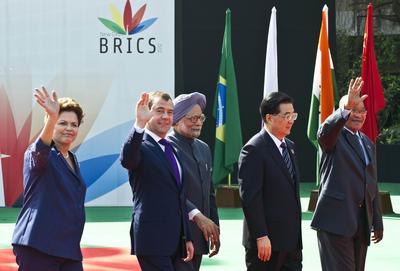The demand for a new international institution stems from growing frustration with existing financial institutions and the ‘capture’ of their leadership by the US and Europe (which reserve the top position in the World Bank and the IMF, respectively).
The global order has been in flux since the end of the Cold War, with two fundamental trends reshaping the international system. First, power shifts at the global level are creating a more diverse international order as emerging and resurgent players pursue and assert their own interests. In turn, the likelihood of effective policy coordination has been reduced. Diverging interests and diverse perspectives on how to approach the growing number of new and longstanding issues on the international agenda have led to greater fragmentation of world politics.
Second, the emerging international order is characterised by deepening interdependence. All major — and minor — powers face challenges of economic growth, energy security and environmental sustainability, all of which are intimately interconnected and which no nation can successfully confront on its own. This creates a fundamental dilemma: managing this interdependence through multilateral cooperation demands enlightened self-interest and improved means of interaction.
As a result, the prospects for effective global governance — broadly defined as the collective management of common problems at the international and transnational level — are deteriorating. This is because global challenges such as climate change, poverty, food insecurity, nuclear proliferation and economic crises are increasing in number, scale and complexity.
The G20 is the most important recent innovation in global governance, even if its legitimacy is now being contested. Its creation signals that the international system is trying to respond to new challenges and fix urgent problems through new initiatives. The G20 played a crucial role in dealing with the immediate challenges of the 2008 global financial crisis, but this has also reinforced the perception that global governance is, in essence, global crisis management.
There is another factor at work. As international relations become more diverse and complex, power is not only shifting from established to emerging countries, but toward individuals and non-state actors. The internet and social media are extending the reach and influence of individuals and organisations, and enabling them to directly engage in international affairs.
Non-state actors, including transnational NGOs, civil society groups, social entrepreneurs, religious organizations, multinational corporations and trans-sectoral public policy networks have become increasingly effective in framing issues, setting agendas and mobilising public opinion. At the same time, non-state actors such as criminal organisations and terrorist networks — also empowered by new information and communication technologies — pose serious threats to the international system. Even though non-state actors usually have no formal decision-making powers and do not necessarily alter the policy making process, their impact on world politics is significant and likely to grow.
But the new configuration of international relations — including the growing importance of emerging countries and non-state actors — is inherently chaotic and ungovernable. The new global order cannot be accurately described as a multipolar world, in which a few great powers are setting the rules of the game and disciplining those who violate them. A concert of powers may not be plausible, but cacophony is not the only other option.
Global governance will become more difficult, but not impossible. Even in a world without powerful organising forces, there are magnetic pulls and tugs — a ‘weak polarity’ — that can align nations and facilitate cooperation and collaborative efforts. One defining characteristic of the emerging new age is that power, at least in the sense of traditional ‘hard’ power, and leadership are less linked. In the absence of a comprehensive, unitary approach to global governance, new forms of leadership will emerge.
Most emerging countries are content with making adjustments, rather than upending the existing system of global governance. Yet the future international order will be no mere outgrowth of existing mechanisms.
There is a lack of vision about the future of the international system and the emerging global order. The time has come for a strategic conversation about global governance and the foundations of a new international order.
Brad Glosserman is Executive Director at the Pacific Forum CSIS, Washington, DC.
Peter Walkenhorst is a project manager at the Bertelsmann Foundation.
Ting Xu is a senior project manager at the Bertelsmann Foundation.
This is an abridged version of a report titled ‘Concert or Cacophony? In Search of a New International Order’, a joint project by the Bertelsmann Foundation and Pacific Forum CSIS, and is available here.

